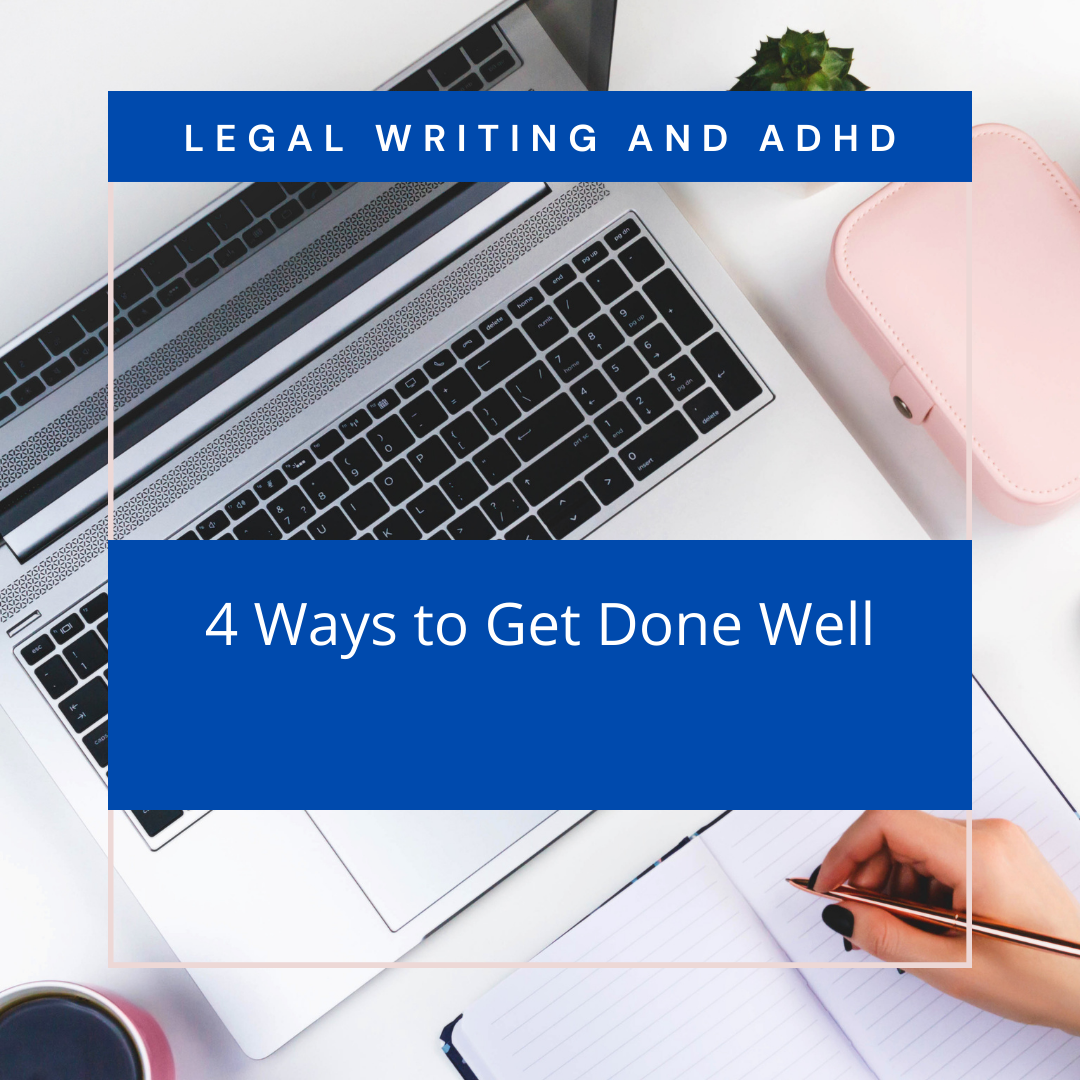Legal writing can be intimidating for anyone, but more so if you have ADHD. We are expected to sift through a mountain of facts, cases, legal theories, and policy arguments to find the most important and persuasive of each and then to use them to weave together a coherent argument that overpowers our adversary. For the legal writer with ADHD, this task can seem overwhelming. The legal writing project seems like a blank canvas with no obvious beginning or end. The thought of writing can intimidate the writer, who procrastinates until the deadline is looming and then in a fear-fueled spurt of adrenaline gets it done. It’s not pretty, but it’s done. Another disaster averted. Maybe.
There’s a better way.
Have a Template
Jeff Copper, a recognized ADHD thought leader, describes it this way: “If it is unclear about what to do, how long it will take, what input is needed, or what perspective to take, the ADHD brain will reflexively try to escape to more pleasurable activities.” Listen to his podcast for more tips. In my experience, a template can bring clarity to the writing task. Think of it this way, if you have a template that you can superimpose over the blank canvas, all of a sudden, it’s not blank and there is a structure to it. For instance, if you have to write a motion, here is a template you can use:
A. Who are you and why you are filing this motion?
In the introduction paragraph you should tell the Judge who you are, who you represent and what you are doing. For example: Respondent (client name) through his attorney (your name) is filing a motion (name of motion) requesting that this court enter an order that (what do you want the court to do).
B. Why should you win?
Tell the Judge what
- facts,
- law, or
- policy
supports your request.
C. What are you asking for?
Sum it all up and tell the Judge, again, what you want them to do:
Wherefore, Respondent requests that…
D. Who are you?
Sign your name and provide your contact information
E. Did you serve the other side and how?
Certificate of Service
F. Can you make it easy on the Judge?
Provide a draft order. It clarifies what you want and it can save the Judge and the Judge’s Clerk a lot of time.
As you can see, I broke this into 6 questions. There are other templates for other legal writing projects. I found an excellent one on Reddit that seems to have been posted by a legal writing instructor. This one may be helpful for anyone who has to write legal memoranda. Once you have a template, the project won’t feel like a blank canvas. In the case of the motion I just discussed, it’s just 6 questions that need to be answered, and not all of them have to be answered today.
Chunk it.
Writing the whole motion at one sitting can be overwhelming unless you are in a flow state of mind. If you’re not, one way of conquering the project is to break it into manageable pieces. You might decide that you have to break the project into 5 or 6 chunks and that you will do one chunk each day, so that you complete the project by the end of the week. Because transitioning in and out of projects is difficult for people with ADHD, you may find that once you have started the motion it’s easier just to finish it in one or two sittings.
Speak it Before you Write it
If I were to ask you why should you win, could you answer that question in less 3 minutes? Some people are verbal processors. They think out loud and can explain things in a crisp and logical way when they are speaking but get all tied up when they have to write their thoughts down. If that sounds like you, try asking yourself why you should win and record your response. If your response is short and to the point, use the recorded response as the starting point for your writing.
Write it Before You Revise It
Many people with ADHD are perfectionists. I know this sounds inconsistent with our lack of attention to detail, but it may be an overcompensation. Think of it this way: because we know that we miss details, we review our work endlessly to make sure we haven’t missed a single detail. This is paralyzing especially if you start revising before you have completed the project. As a general rule, don’t start revising until you have completed the writing project. Revising as you go along is an excellent way to miss due dates and filing deadlines. You have to always remember that completion is the goal not perfection. I am not saying that you should not revise as you are going along if you realize that you are taking the substantively wrong approach—that is different. Most revisions don’t rise to that level. Revisions that fine tune the analysis or make it better, can wait.
Writing is an integral part of what we do as lawyers. If you are finding this part of your job challenging these tips could help. Partner Up also offers ADHD coaching and individualized legal writing coaching. Reach out for a free initial consultation with one of our coaches by booking a an introductory call at: https://www.partnerupcoaching.com/coaching/ .
Writing is an integral part of what we do as lawyers. If you are finding this part of your job challenging these tips could help. Partner Up also offers ADHD coaching and individualized legal writing coaching. Reach out for a free initial consultation with one of our coaches.


0 Comments